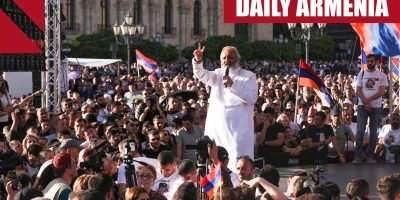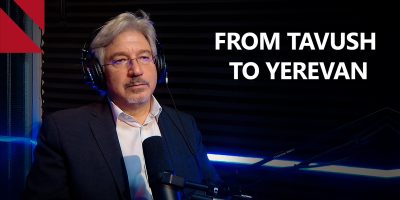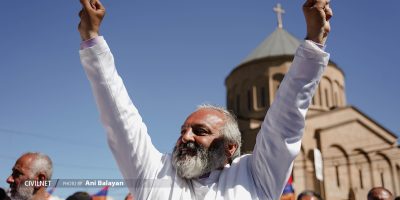Emil Sanamyan, editor of the USC Institute of Armenian Studies Focus on Karabakh platform and specialist on the South Caucasus spoke with CivilNet’s Karen Harutyunyan on Nagorno-Karabakh on military and diplomatic fronts.
Q. It’s already the 25th day of a war in Nagorno Karabakh which has changed the status quo — a situation that has held since 1994. Some analysts claim that Azerbaijan failed in its blitzkrieg, while many point out certain Azerbaijani advances in the north and especially in the south. How would you assess the general situation?
As it stands, the general picture is not favorable to Armenians. Direct Turkish involvement through its air force and some 2,000 mercenary fighters has tipped the balance of forces in Azerbaijan’s favor and the Armenian side suffered heavy casualties. Armenia has been unable to draw in sufficient Russian military support to check this Turkish role and has to rely on mostly domestic resources: reservists and volunteers. While Azerbaijani losses have also been heavy, they have managed to retain the initiative and remain on offensive in two directions: northern (Martakert) and southern (Hadrut). While the northern frontline has generally held, the southern has not and over the last two weeks we have had continued advancement by Azerbaijani forces and their allies in the directions of Meghri and Kapan — in Armenia itself – and the Berdzor (Lachin) road.
Q. Azerbaijan at the moment seems not willing to accept the Lavrov plan, which envisages the return of five of the seven territories surrounding Karabakh and later, upon the definition of NK’s status, return of the two other territories ensuring a land connection between NK and Armenia. According to some sources, Azerbaijan raised the bar and now demands the town of Shushi too. Also, President Aliyev announced that he will never accept a referendum on status of Nagorno Karabakh. On the other hand, the Armenian Prime Minister Nikol Pashinyan once again publicly refused the Lavrov plan that was announced by the Russian Foreign Minister himself on October 14, and called on compatriots to continue fighting for the rights of the Artsakh people. However, a few days later, according to some reports, Armenia agreed to start talks over the Lavrov plan. What are the positions and expectations of the parties? When can the negotiations start and from what point?
The positions and expectations evolve as the situation on the ground evolves. If Azerbaijan manages to retain control of most of the districts in the south of Karabakh, then naturally that voids a big part of the “Lavrov plan” which called for Armenian surrender of those areas as a key compromise. Only through rebalancing of the situation on the ground can any new ceasefire and talks be expected. Otherwise, Aliyev will continue to press his initiative, as did Elchibey in 1992-93, which was the last period the Azerbaijani side had this extent of military advance into Armenian-controlled territory.
Q. Russian brokered humanitarian ceasefire has failed twice. Why wasn’t it possible to cease the hostilities? And how/if Russia can exert its leverage to stop hostilities?
In a big part, this is because of the break of the southern frontline, and Aliyev’s efforts to capture as much of the largely undefended territory in the south of Karabakh as possible. Of course, none of that would have been possible without Erdogan’s backing. Russia could stop hostilities via more direct military intervention that would send a more direct message to Aliyev and Erdogan.
Q. Armenian and Azerbaijani foreign ministers are going to meet in Washington tomorrow, October 23. How do you assess the chances of the US brokerage, given that Moscow’s attempts have failed?
I am not optimistic about US engagement, considering their general record of disengagement from the region to date, as well as the administration’s singular focus on the upcoming election. The best the US could do is to offer some humanitarian support to Armenia, and issue some threat of financial sanctions against Aliyev and Erdogan over the war crimes committed, but it is unclear to me if any of that is forthcoming.
Q. How can this war evolve? What will be the implications for the peace process?
It is not easy to predict these things, but it has been obvious for a long time that Armenia’s war-fighting abilities are much diminished when there is direct Turkish involvement in the fighting. These countries are just in different weight categories. I don’t see any other actor aside from Putin’s Russia able to check this factor effectively. Unless Armenia and Russia manage to come to an agreement on that, this is uncharted territory for Armenia and could precipitate the worst crisis for Armenians since the genocide and its aftermath a century ago. Even in the case of Russia’s involvement, it is clear to me that Turkey will remain involved as well, and its involvement would have to be considered in any future peace talks. In fact, if Armenia could mitigate the extent of Turkish involvement through formal acceptance of Turkey’s diplomatic role – as Turkish officials have said they want to have – it should not be dismissed.
















